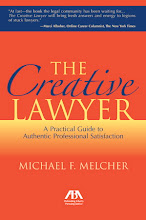When I was in business school, my friend Polly and I decided to name ourselves the two peppiest people at the Stanford Graduate School of Business.
We did this not because of our inherent Pollyanna natures or our uncritical admiration for all thing b-school; quite the opposite. We made this decision because we recognized we were in danger of falling under the sway of cynicism, and still had the clear vision to see that this would not be a good thing.
MBA students are very peppy. They are high-energy, can-do people. Compared with, say, law students, they focus on execution more and analysis less.
When we started business school, Polly and I felt different from the mass of b-school students, and one of the ways we felt different is that we were skeptical of jump-on-board group activities. We felt proud of our critical faculties. We understood the world. And its difficult complexities. And its iss-shoes. More than others, anyway.
But then we realized that critical faculties can come at a cost. We found ourselves holding back from what we were experiencing, and from what we were contributing.
So we decided we would be the two peppiest people at Stanford business school. We also decided that our most dreaded class, Cost Accounting, was actually our favorite class. “Are you ready to study for our favorite class?” one of us would ask. “Omigod, I can’t wait to get started on our favorite class!” the other would reply.
Sometimes it was difficult to fulfill our mission. Polly went on a study trip to Chile and Argentina with a group of b-school students. “Let me tell you,” she wrote. “It is quite a tall order to be the peppiest person amidst a group of people who are getting up at 6 to go jogging in downtown Santiago. Extreme levels of peppiness are in evidence.”
Other times, people were not so supportive of our peppiness. When we started something called The George Stephanopoulos Fan Club (this was in the early Clinton days), and created our own fanzine, Stephanoupouletter, just for fun and the prospect of fame, some of our classmates thought we were incredibly witty and creative fun, and others thought we were kind of weird. It sure opened us up, though, and we even got into People magazine.
Deciding you are going to be the peppiest person in your environment really does change the way it looks for you. You choose one path – positive energy – over another – detached analysis. You pull open the shades and let the light pour in, even if it might bleach out your expensive carpets.
In certain professions – law comes to mind – deciding you are going to be known to be peppy takes courage, since peppiness is not always a culturally smiled-on characteristic. But try it. It gives you options, and you might like it.
Tuesday, August 28, 2007
Thursday, August 09, 2007
Achieving Career Happiness by Being Gay on the Inside
One of my clients works for a big, fancy firm. It’s the kind of firm that people who went to Harvard go to if they want even more Harvard in their life.
This particular client has dreams besides being one of a thousand employees of a highly branded business, but he is not sure whether he will pursue those dreams. Setting off for the unknown involves risks and the benefits are uncertain.
Recently, he pondered aloud to me, “I wonder if the reason you’ve made so many career transitions is that you’re gay. I mean that in a good way. One of my siblings came out the closet recently and then completely changed her career. Once she made that big break from convention, other breakthroughs were possible.””
I nodded sagely, as I sometimes do. “You’re right,” I said. “Career change is probably easier if you are gay. A big part of coming out is recognizing that you are not going to get acceptance and approval from everyone, including in many instances your own family. So you develop a basic undertanding that what you truly want and need may be quite different from the world’s expectations of you. If you naturally expect a certain amount of rejection and befuddlement from the world, they don’t fase you as much when they happen.”
“In addition, coming out is a process of sorting out your adult self, and understanding how that’s different from the childhood image of what you thought you were going to be. When I was twelve years old, I thought that success would involve my becoming a lawyer, getting married and having kids, and being elected to the U.S. Senate. When I realized that some of those things were not going to happen in the way I imagined, it freed me to envision how all the other aspects might be different too. Accepting that you can’t be like everyone, and may not even have the same options, can be very freeing.”
“Conversely,” I added, “if you fit in too easily, you may never explore who you really are beneath the acceptable exterior.”
My client nodded, somewhat sadly, silently reflecting on the ways that he is like many others in the particular demimonde of affluent professional New York—married, white, earning a good salary, working for the well-branded company. And therefore, somewhat trapped by expectations.
“But don’t worry,” I assured him. “You can be gay on the inside.”
“Really?” he said brightly. “That makes me feel much better about everything.”
Anyone can be gay on the inside. It just requires three things: (1) consider that you might be different from the way people think you are; (2) consider that you might be different from the way you think you are supposed to be; (3) be willing to accept that other people may disapprove of your choices, and realize that their approval doesn’t matter all that much anyway.
Get past those things, and you can start thinking about what you really need to be in order to be your true self.
This particular client has dreams besides being one of a thousand employees of a highly branded business, but he is not sure whether he will pursue those dreams. Setting off for the unknown involves risks and the benefits are uncertain.
Recently, he pondered aloud to me, “I wonder if the reason you’ve made so many career transitions is that you’re gay. I mean that in a good way. One of my siblings came out the closet recently and then completely changed her career. Once she made that big break from convention, other breakthroughs were possible.””
I nodded sagely, as I sometimes do. “You’re right,” I said. “Career change is probably easier if you are gay. A big part of coming out is recognizing that you are not going to get acceptance and approval from everyone, including in many instances your own family. So you develop a basic undertanding that what you truly want and need may be quite different from the world’s expectations of you. If you naturally expect a certain amount of rejection and befuddlement from the world, they don’t fase you as much when they happen.”
“In addition, coming out is a process of sorting out your adult self, and understanding how that’s different from the childhood image of what you thought you were going to be. When I was twelve years old, I thought that success would involve my becoming a lawyer, getting married and having kids, and being elected to the U.S. Senate. When I realized that some of those things were not going to happen in the way I imagined, it freed me to envision how all the other aspects might be different too. Accepting that you can’t be like everyone, and may not even have the same options, can be very freeing.”
“Conversely,” I added, “if you fit in too easily, you may never explore who you really are beneath the acceptable exterior.”
My client nodded, somewhat sadly, silently reflecting on the ways that he is like many others in the particular demimonde of affluent professional New York—married, white, earning a good salary, working for the well-branded company. And therefore, somewhat trapped by expectations.
“But don’t worry,” I assured him. “You can be gay on the inside.”
“Really?” he said brightly. “That makes me feel much better about everything.”
Anyone can be gay on the inside. It just requires three things: (1) consider that you might be different from the way people think you are; (2) consider that you might be different from the way you think you are supposed to be; (3) be willing to accept that other people may disapprove of your choices, and realize that their approval doesn’t matter all that much anyway.
Get past those things, and you can start thinking about what you really need to be in order to be your true self.
Subscribe to:
Posts (Atom)

